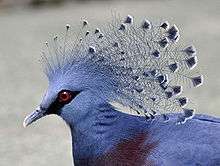Crowned pigeon
The crowned pigeons (Goura) is a genus of birds in the family Columbidae. It contains four large species of pigeon that are endemic to the island of New Guinea. The species are extremely similar to each other in appearance, and occupy different regions of New Guinea. The genus was introduced by the English naturalist James Francis Stephens in 1819.
| Crowned pigeon | |
|---|---|
 | |
| Victoria crowned pigeon | |
| Scientific classification | |
| Kingdom: | Animalia |
| Phylum: | Chordata |
| Class: | Aves |
| Order: | Columbiformes |
| Family: | Columbidae |
| Genus: | Goura Stephens, 1819 |
| Type species | |
| Columba cristata Pallas, 1764 | |
Systematics and evolution
The genus Goura was introduced by the English naturalist James Francis Stephens in 1819. The type species is the western crowned pigeon.[1][2] The word Goura comes from the New Guinea aboriginal name for crowned pigeons.[3]
The genus contains four species:[4]
- Western crowned pigeon (Goura cristata)
- Scheepmaker's crowned pigeon (Goura scheepmakeri)
- Sclater's crowned pigeon (Goura sclaterii)
- Victoria crowned pigeon (Goura victoria)
Scheepmaker's crowned pigeon and Sclater's crowned pigeon were previously considered as conspecific with the English name "southern crowned-pigeon".[4]
A molecular phylogenetic study published in 2018 found that the four species in the genus formed two pairs: the western crowned pigeon was sister to Sclater's crowned pigeon while Scheepmaker's crowned pigeon was sister to the Victoria crowned pigeon.[5]
| Goura phylogeny | ||||||||||||||||||||||||||||||||||||||||||
| ||||||||||||||||||||||||||||||||||||||||||
| Cladogram showing the crowned pigeons and their closest relatives based on a study by Bruxaux and colleagues published in 2018.[5] |
Description
They are natives of New Guinea and a few surrounding islands. They forage on the forest floor eating fallen fruit, seeds and snails. The males and females are almost identical, but during courtship the male will coo and bow for the female. Both parents incubate one egg for 28 to 30 days and the chick takes another 30 days to fledge. The life span can be over 20 years.
References
- Stephens, James Francis (1819). General Zoology, or Systematic Natural History (in English and Latin). Volume 11 Part 1. London: G. Kearsley. p. 119.
- Peters, James Lee, ed. (1937). Check-list of Birds of the World. Volume 3. Cambridge, Massachusetts: Harvard University Press. p. 140.
- Jobling, J.A. (2018). del Hoyo, J.; Elliott, A.; Sargatal, J.; Christie, D.A.; de Juana, E. (eds.). "Key to Scientific Names in Ornithology". Handbook of the Birds of the World Alive. Lynx Edicions. Retrieved 29 March 2018.
- Gill, Frank; Donsker, David, eds. (2017). "Pigeons". World Bird List Version 8.1. International Ornithologists' Union. Retrieved 28 January 2018.
- Bruxaux, J.; Gabrielli, M.; Ashari, H.; Prŷs-Jones, R.; Joseph, L.; Milá, B.; Besnard, G.; Thébaud, C. (2018). "Recovering the evolutionary history of crowned pigeons (Columbidae: Goura): Implications for the biogeography and conservation of New Guinean lowland birds". Molecular Phylogenetics and Evolution. 120: 248–258. doi:10.1016/j.ympev.2017.11.022.
| Wikimedia Commons has media related to Goura. |